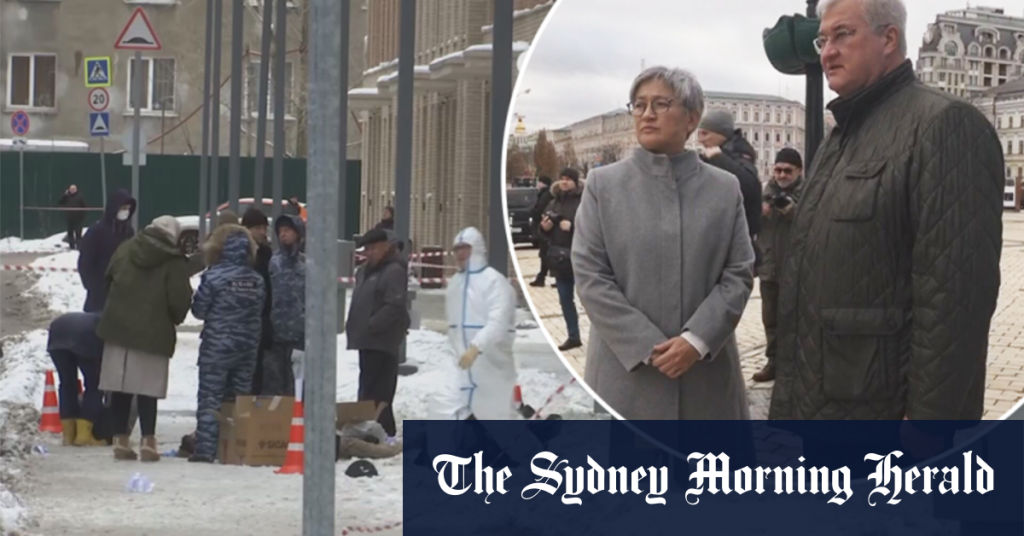Australian Foreign Minister Penny Wong’s visit to Ukraine in December 2024 marked a significant step in reaffirming Australia’s commitment to Ukraine’s sovereignty and its ongoing struggle against Russian aggression. The centerpiece of her visit was the announcement of the reopening of the Australian embassy in Kyiv, a symbolic gesture underscoring Australia’s enduring support and faith in Ukraine’s future. This decision, made over two years after the initial Russian invasion forced its closure, signals a belief in the increasing stabilization of the security situation, at least within the capital city, and represents a tangible return to a more normalized diplomatic presence. It facilitates more direct engagement with the Ukrainian government, enables more efficient delivery of Australian aid, and demonstrates solidarity with the Ukrainian people as they rebuild their nation. The reopening of the embassy also serves as a platform for strengthening bilateral relations and exploring avenues for future cooperation in various sectors.
Wong’s visit was not merely about bricks and mortar diplomacy. It provided a vital opportunity for her to engage in high-level discussions with Ukrainian officials, including President Volodymyr Zelenskyy, to reiterate Australia’s condemnation of Russia’s illegal and unprovoked invasion and its continuing violation of international law. These discussions served as a forum to reaffirm Australia’s ongoing commitment to providing practical assistance to Ukraine, encompassing military aid, humanitarian support, and financial contributions to bolster the country’s resilience and recovery. Furthermore, Wong’s presence on the ground enabled her to gain firsthand insights into the devastating impact of the war on Ukrainian citizens and infrastructure, allowing for a more informed and nuanced understanding of the challenges facing the country. This direct engagement strengthens the bilateral relationship by demonstrating empathy and a commitment to understanding the situation directly from Ukrainian perspectives.
The reopening of the embassy also carries significant practical implications for Australia’s engagement with Ukraine. It allows for the resumption of full diplomatic services, which benefits both countries. Australian citizens in Ukraine will have improved access to consular support, while Ukrainian citizens seeking visas or other assistance from Australia will have a more efficient and readily accessible channel. Furthermore, the embassy provides a base for Australian officials to monitor the evolving political, security, and economic landscape in Ukraine, providing crucial insights that inform policy decisions and aid distribution. This improved on-the-ground presence facilitates more effective coordination with international partners and allows for more agile responses to the evolving needs of Ukraine.
Beyond the immediate practical implications, the reopening of the embassy symbolizes a broader commitment to long-term partnership and support. It signals Australia’s belief in Ukraine’s future and its commitment to supporting the country’s reconstruction and development efforts. This encompasses not only financial and humanitarian aid but also potential collaborations in areas like education, trade, and cultural exchange. The embassy will serve as a hub for fostering these partnerships, allowing for closer connections between Australian and Ukrainian businesses, academics, and cultural institutions. This multifaceted approach to support recognizes that true recovery extends beyond immediate humanitarian needs and necessitates fostering long-term sustainable development.
Wong’s visit and the embassy reopening also send a strong message to the international community. It reaffirms Australia’s unwavering support for a rules-based international order and its condemnation of Russia’s aggression. By reopening its embassy, Australia joins other nations in demonstrating a collective resolve to stand with Ukraine and uphold international law. This unified front sends a clear signal to Russia that its actions are unacceptable and that the international community remains committed to supporting Ukraine’s sovereignty and territorial integrity. Australia’s actions contribute to the pressure on Russia to cease its aggression and engage in meaningful diplomatic efforts to resolve the conflict peacefully.
In conclusion, Penny Wong’s visit to Ukraine and the reopening of the Australian embassy represent a significant milestone in the bilateral relationship. The decision signals a deepening commitment to supporting Ukraine’s sovereignty, security, and long-term recovery. It also reinforces Australia’s dedication to upholding international law and standing against aggression. The embassy reopening is not just a symbolic gesture; it is a practical step that will facilitate stronger diplomatic ties, more effective aid delivery, and deeper engagement across various sectors. It marks a renewed chapter in the Australia-Ukraine relationship, built on shared values and a commitment to a peaceful and prosperous future for Ukraine.

